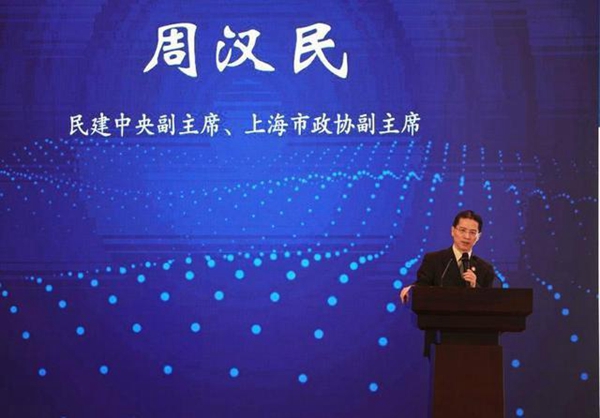Shanghai FTZ to better serve Yangtze River Delta integration

Zhou Hanmin, vice-chairman of the CPPCC Shanghai Committee, delivers a keynote speech at the first High-level Forum on the Integrated Development of the Yangtze River Delta in Wuhu, Anhui province on May 22. [Photo/WeChat account: Shanghai FTZ]
Zhou Hanmin, vice-chairman of the CPPCC Shanghai Committee, delivered a keynote speech at the first High-level Forum on the Integrated Development of the Yangtze River Delta, which was held in Wuhu, Anhui province on May 22.
He noted that the establishment of the China (Shanghai) Pilot Free Trade Zone was an unprecedented "self-opening" of China, a "window" for open model innovation, and a "big demonstration" of institutional reform.
"To achieve the high-quality integrated development of the Yangtze River Delta region, we should promote the far-reaching effect of the free trade zone that spreads to different areas," Zhou said.
He added that we should make full use of the leading role of the free trade zone as a center of opening-up. The experience should be able to replicated and promoted elsewhere, and its far-reaching effect is even more critical.
Zhou also proposed some suggestions on how to promote the far-reaching effect of the new round of reform experiments on the Yangtze River Delta region.
He stated that the free trade zone should adapt the new model. It has the potential to become a "strategic industry core area" by gathering global high-end resources and developing strategic industries that are related to the long-term security and competitiveness of the country's economy.
It can develop into an "offshore finance pilot zone," which means an offshore financial center related to national financial security and long-term financial competitiveness. It is possible to make major breakthroughs in the RMB capital account convertibility and cross-border financial business.
In addition, it can become a "global collaborative zone for scientific and technological innovation," which is a global research and development center devoted to consistently pursuing future development.
It can also become the continental headquarters base of multinational companies by improving its appeal.
Zhou suggested that the free trade zone should achieve institutional innovation. It should further uphold the highest international standards and strive to reach the highest levels. It can use the Internet of things, cloud computing, big data, artificial intelligence, and blockchain technology to achieve the most smart and efficient management.
The free trade zone should also explore the integration of work and life. It can become a demonstration zone, leading zone, and exploration zone for high-quality living. "A high quality of life should become the standard here due to the need to bring together high-level personnel from across the world," he said.
He stressed the need to promote the implementation of reform measures in the Yangtze River Delta region. Zhou also proposed that the regional economic and social development plans of the three provinces and one city in the region should focus on integrity, coordination, and being systematic.
"First and foremost, planning should be integrated and steadily promoted, so that the people in the Yangtze River Delta region can have a sense of accomplishment and a sense of gain in the process of integration," he said. "At the same time, we should focus on differentiated competition and development."
 Contact Us
Contact Us

 Pudong lights up city with spectacular shows and cultural marvels
Pudong lights up city with spectacular shows and cultural marvels Brilliant light show to illuminate Huangpu River
Brilliant light show to illuminate Huangpu River Maple leaves paint splendid scenery in Pudong
Maple leaves paint splendid scenery in Pudong Appreciate alluring lotus blossoms in Pudong's Century Park
Appreciate alluring lotus blossoms in Pudong's Century Park


